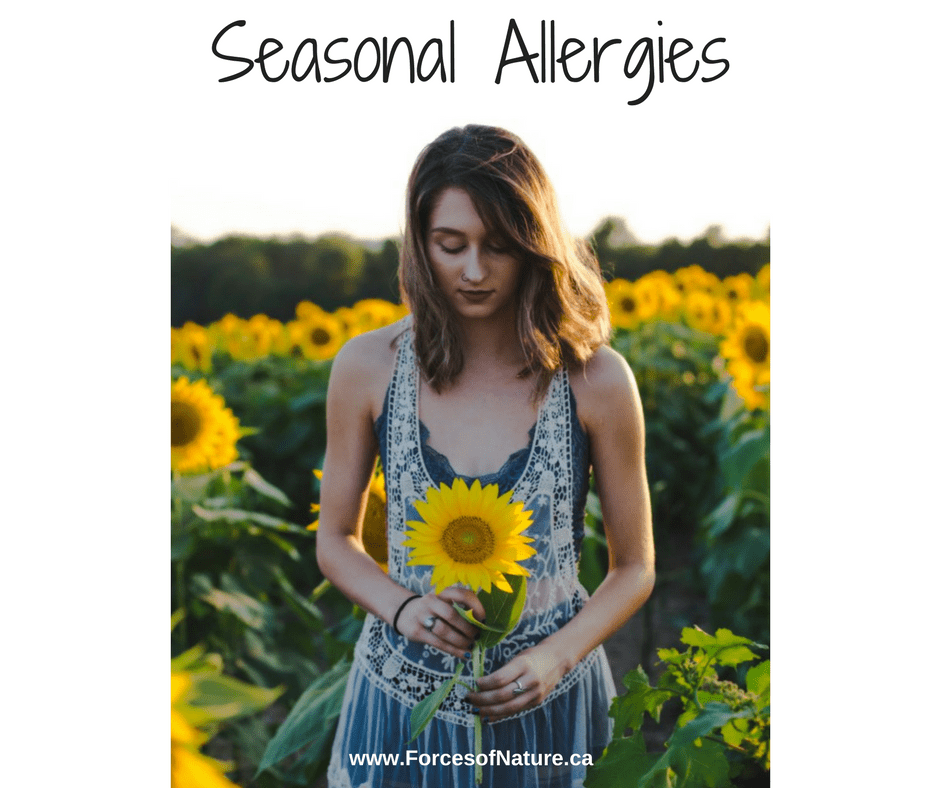Seasonal Allergies
By Dr. Pamela Frank, BSc, Naturopathic Doctor
What are the symptoms of seasonal allergies?
- congestion in your nose
- pressure in your sinuses, which may cause sinus headaches
- runny nose, usually with clear discharge
- itchy, watery eyes
- a scratchy throat
- cough
- dark circles under the eyes
- puffy eyes
- decreased sense of taste or smell
- post-nasal drip
What Causes Seasonal Allergies?
Seasonal allergies are not just due to an immune system response to pollen. Your immune system should not consider pollen to be a foreign invader that requires an immune system attack. Allergies are a sign of inflamed and irritated tissue in the respiratory tract that has become super sensitive to particulate matter that should not normally trigger an immune response. Below are a number of factors that can contribute to this irritated tissue.
Underlying food allergies or sensitivities or intolerances
Almost everyone has sensitivities to certain foods. The most common ones are dairy, eggs, gluten, pineapple, almonds and beans like kidney beans and green beans. Therefore consuming these foods provokes the production of antibodies that lead to inflammation that can leave nasal tissue easily irritated by fumes, chemicals, dust, pollen or mold spores. Our naturopathic doctors can help guide you through an elimination diet or order blood testing for food allergies or sensitivities.
Toxin overload
If your liver is not efficiently clearing waste and pollution from your body, then these chemicals can accumulate and irritate tissue, leaving it sensitive to pollen. Improving phase I and phase II liver detoxification through supportive nutrients like n-acetyl cysteine, milk thistle, grape seed extract, vitamin B6 in the form of pyridoxal-5-phosphate, L-5MTHF, calcium-d-glucarate, indole-3-carbinol and amino acids like histidine, taurine, methionine, glycine and serine can help your liver to more easily package toxins for excretion.
Lack of vitamin C and vitamin B6
Vitamin C and B6 are both natural anti-histamines. Both are necessary in greater quantities when you are under stress. In some cases of seasonal allergies, helping my patient replenish both vitamins and has helped long term allergies to subside.
Lack of vitamin A
Vitamin A is a fat soluble vitamin that is crucial to the health of mucous membranes. Mucous membranes are what line the entire respiratory tract, so a lack of vitamin A leaves that tissue unhealthy and more susceptible to irritation. One of the only foods that supplies pre-formed vitamin A is liver. Otherwise, we acquire beta carotene from foods like carrots, Swiss chard, kale and spinach and our liver has to convert that to vitamin A. Vitamin A accumulates in your body so long term supplementation is not recommended. Vitamin A supplements should be avoided in women who are pregnant, breast feeding and in children. A vitamin A derivative has been shown to have anti-allergic effects in an allergy model in mice. It works by balancing the immune system.
Overgrowth of harmful bacteria/yeast in the digestive tract and a lack of probiotic bacteria
Good bacteria help keep the immune system functioning normally by moderating immune system activity. Antibiotic use wipes out good bacteria and allows overgrowth of unhealthy bacteria or yeast that can push the immune system into inflammation overdrive. Killing off gut bacteria or yeast excess and restoring healthy beneficial flora can help settle down an overly active immune system. An Italian study found that a Bifidobacteria mixture was capable of significantly improving allergy symptoms and quality of life in children with pollen-induced allergies and intermittent asthma. Another found a combination probiotic of Lactobacillus gasseri and two strains of Bifidobacter improved quality of life during allergy season for otherwise healthy individuals with self-reported seasonal allergies.
Our naturopathic doctors can help provide natural treatment for allergies. Book an appointment now.
Natural Allergy Treatment Research
Miraglia Del Giudice M, Indolfi C, Capasso M, Maiello N, Decimo F, Ciprandi G. Bifidobacterium mixture (B longum BB536, B infantis M-63, B breve M-16V) treatment in children with seasonal allergic rhinitis and intermittent asthma.
Ital J Pediatr. 2017 Mar 7;43(1):25. doi: 10.1186/s13052-017-0340-5. https://www.ncbi.nlm.nih.gov/pubmed/28270216
Dennis-Wall JC, Culpepper T, Nieves C Jr, Rowe CC, Burns AM, Rusch CT, Federico A, Ukhanova M, Waugh S, Mai V, Christman MC, Langkamp-Henken B. Probiotics (Lactobacillus gasseri KS-13, Bifidobacterium bifidum G9-1, and Bifidobacterium longum MM-2) improve rhinoconjunctivitis-specific quality of life in individuals with seasonal allergies: a double-blind, placebo-controlled, randomized trial.
Am J Clin Nutr. 2017 Mar;105(3):758-767. doi: 10.3945/ajcn.116.140012. Epub 2017 Feb 22. https://www.ncbi.nlm.nih.gov/pubmed/28228426
Son HL, Park HR, Park YJ, Kim SW. Effect of Retinoic Acid in a Mouse Model of Allergic Rhinitis. Allergy Asthma Immunol Res. 2015 Nov;7(6):590-8. doi: 10.4168/aair.2015.7.6.590. Epub 2015 Jun 2.
https://www.ncbi.nlm.nih.gov/pubmed/26333706
Thornhill SM, Kelly AM. Natural treatment of perennial allergic rhinitis. Altern Med Rev. 2000 Oct;5(5):448-54. https://www.ncbi.nlm.nih.gov/pubmed/11056414
Ipci K, Altıntoprak N, Muluk NB, Senturk M, Cingi C. The possible mechanisms of the human microbiome in allergic diseases. Eur Arch Otorhinolaryngol. 2017 Feb;274(2):617-626. doi: 10.1007/s00405-016-4058-6. Epub 2016 Apr 26.
https://www.ncbi.nlm.nih.gov/pubmed/27115907
